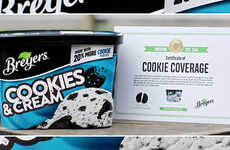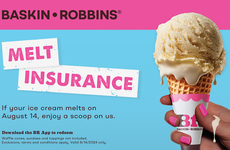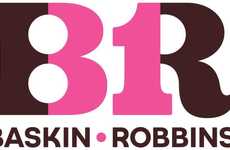
Baskin-Robbins Shorts Pints By 4 Ounces
Cool Hunter — May 16, 2007 — Lifestyle
References: findthepinkspoon & digg
Baskin-Robbins has been fined $500,000 for under packing their 'hand packed pints' of ice cream. On average pints were short by 4 ounces each. A consumer protection lawsuit was launched and Baskin-Robbins wrists have been duly slapped.
Implications - With customers expecting to receive a full pint of ice cream, it's a little upsetting that Baskin Robbins has been cheating. A whopping 83 percent of their "hand-packed pints" were found to be under that amount. Hopefully, now the company, whose ice cream is still undeniably delicious, will be giving customers the amount of ice cream they want and paid for.
No company wants a bad reputation with its customers, especially if it's an ice cream company that's most popular during the summer months.
Implications - With customers expecting to receive a full pint of ice cream, it's a little upsetting that Baskin Robbins has been cheating. A whopping 83 percent of their "hand-packed pints" were found to be under that amount. Hopefully, now the company, whose ice cream is still undeniably delicious, will be giving customers the amount of ice cream they want and paid for.
No company wants a bad reputation with its customers, especially if it's an ice cream company that's most popular during the summer months.
Trend Themes
1. Underpacking Controversy - This trend highlights the increasing scrutiny on companies underpacking their products, which presents an opportunity for innovation in packaging and quality control.
2. Consumer Demand for Transparency - This trend emphasizes the growing expectation among consumers for accurate product measurements, creating a need for improved transparency in the food industry.
3. Reputation Management in Food Industry - This trend showcases the importance for food companies to maintain a strong reputation through honest business practices and delivering on customer expectations.
Industry Implications
1. Food Packaging - The food packaging industry can capitalize on the underpacking controversy by developing innovative solutions that ensure accurate product measurements and prevent underfilled containers.
2. Food Retail - The food retail industry can leverage the consumer demand for transparency by implementing stricter quality control measures and providing detailed product information to build trust with customers.
3. Consumer Goods - The consumer goods industry can seize the opportunity to reinforce reputation management by promoting ethical business practices and transparent communication to enhance customer loyalty.
5.4
Score
Popularity
Activity
Freshness























